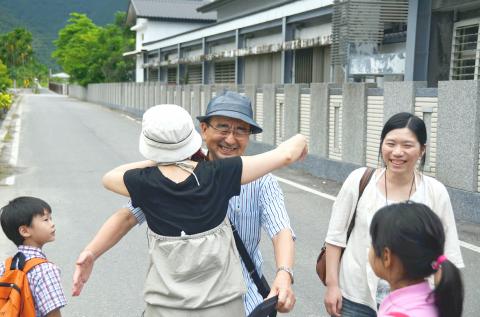Born in Taiwan, but forced to leave his home after Japan lost World War II, Kazuya Shimizu yesterday finally realized his dream of revisiting the site of the village in Hualien County where he was born.
The 70-year-old Shimizu is a wansei, the Japanese term used to describe someone born or who grew up in Taiwan and is a descendant of Japanese immigrants who had come to Taiwan during the Japanese occupation from 1895 to 1945.
Mika Tanaka, the woman who helped him find the site of the village, is a third-generation wansei. She was born in Japan and had come to Taiwan with her parents when she was six. Over the past decade, she has helped more than 130 wansei find the places where they, or their friends or family were born in Taiwan.

Photo: Yang Yi-chung, Taipei Times
Tanaka said Shimizu sought her help after he failed to find the village where he was born — which was called Yoshino Immigrants’ Village at the time — the first two times that he visited Taiwan.
After consulting records detailing the geographical details around Yoshino Village and with the help of Shimizu’s descriptions, Tanaka was able to find the original site of Shimizu’s family house after discovering the wooden foundation under what is now a vegetable field.
Although the house was no longer there, Shimizu was nevertheless very moved to finally see again the place where he had spent the first three years of his life, thanking Tanaka profusely for helping him find his roots.
Along with Tanaka, Shimizu also visited Hualien County’s Chian Household Registration Office yesterday and received the complete records of his family’s household registration during their stay in Taiwan — from the time of Shimizu’s grandfather until their deportation.
“That’s me!” a very excite Shimizu said as he pointed to the record.
Shimizu’s grandfather came to Taiwan 105 years ago, and Shimizu’s father served as the chief of Yoshino Village, as well as the head of its post office, Tanaka said.
Tanaka added that she had also helped apply for the household registration records of five other wansei, now aged 91 to 94, and the records would be sent to Japan by courier.
“Hopefully the documents would sooth their longing for Taiwan — which to them was their second home — and the emptiness they felt after they were forced to leave,” she said.
Tanaka and Shimizu yesterday also visited the village cemetery to pay their respects and pray for the Japanese immigrants buried in Taiwan, including those who had committed suicide, either because they did not want to leave, or because they were unable to accept the news that Japan had lost the war.

The manufacture of the remaining 28 M1A2T Abrams tanks Taiwan purchased from the US has recently been completed, and they are expected to be delivered within the next one to two months, a source said yesterday. The Ministry of National Defense is arranging cargo ships to transport the tanks to Taiwan as soon as possible, said the source, who is familiar with the matter. The estimated arrival time ranges from late this month to early next month, the source said. The 28 Abrams tanks make up the third and final batch of a total of 108 tanks, valued at about NT$40.5 billion

Travel agencies in Taiwan are working to secure alternative flights for travelers bound for New Zealand for the Lunar New Year holiday, as Air New Zealand workers are set to strike next week. The airline said that it has confirmed that the planned industrial action by its international wide-body cabin crew would go ahead on Thursday and Friday next week. While the Auckland-based carrier pledged to take reasonable measures to mitigate the impact of the workers’ strike, an Air New Zealand flight arriving at Taipei from Auckland on Thursday and another flight departing from Taipei for Auckland on Saturday would have to

A group from the Taiwanese Designers in Australia association yesterday represented Taiwan at the Midsumma Pride March in Melbourne. The march, held in the St. Kilda suburb, is the city’s largest LGBTQIA+ parade and the flagship event of the annual Midsumma Festival. It attracted more than 45,000 spectators who supported the 400 groups and 10,000 marchers that participated this year, the association said. Taiwanese Designers said they organized a team to march for Taiwan this year, joining politicians, government agencies, professionals and community organizations in showing support for LGBTQIA+ people and diverse communities. As the first country in Asia to legalize same-sex

MOTIVES QUESTIONED The PLA considers Xi’s policies toward Taiwan to be driven by personal considerations rather than military assessment, the Epoch Times reports Chinese President Xi Jinping’s (習近平) latest purge of the Chinese People’s Liberation Army (PLA) leadership might have been prompted by the military’s opposition to plans of invading Taiwan, the Epoch Times said. The Chinese military opposes waging war against Taiwan by a large consensus, putting it at odds with Xi’s vision, the Falun Gong-affiliated daily said in a report on Thursday, citing anonymous sources with insight into the PLA’s inner workings. The opposition is not the opinion of a few generals, but a widely shared view among the PLA cadre, the Epoch Times cited them as saying. “Chinese forces know full well that